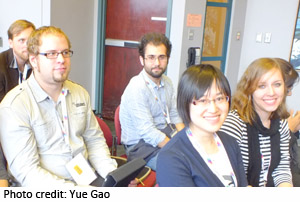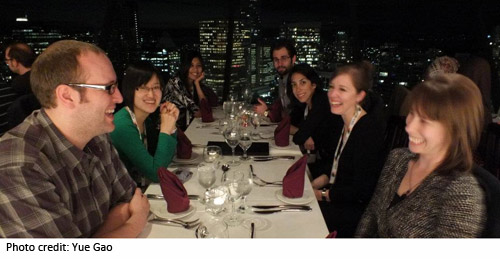

The 10th Annual International Conference on Entertainment Computing (ICEC) was held October 5-8, 2011 in Vancouver. The conference program presented scientific, engineering, design and artistic ideas or improvements to existing techniques in the broad multi-disciplinary field of entertainment computing.
Keynote speakers included Glenn Entis (Beyond Badges – Gamification for the Real World); Regan Mandryk (Playing Digital Games Will Make You a Better Human Being) and Chris Klug (who talked about how the entertainment technology industry says they love stories but the reality is otherwise).
ICEC 2011 was co-chaired by GRAND researchers, Sidney Fels, University of British Columbia and Magy Seif El-Nasr, Northeastern University. GRAND was a proud sponsor.
Collaborating Network Investigator (formerly a PhD fellow with GRAND) Lennart Nacke and GRAND Master’s student Vincent Tsao (University of British Columbia) attended the event. GRAND Central had an opportunity to ask them a few questions about their participation in the event.
"The game research community is a friendly place filled with smart people from diverse disciplines - meeting so many of them in a great place like Vancouver made this an inspiring event!"
Lennart Nacke
Assistant Professor
University of Ontario Institute of Technology
ICEC Presenter
Q Is this your first time attending an ICEC conference?
Yes, first time ever.
Q Describe one (or two) highlight(s) of your overall experience of theconference.
My first highlight of the conference was the talk from Kathrin Gerlingabout designing and evaluating casual health games for children and teenagers with cancer. I had the pleasure to co-supervise Kathrin during a summer project and it was great to see her talk about her previous work on this difficult topic. She managed to give an engaging talk  and highlight some areas where games can really impact people's lives, making it clear that games are a powerful medium that have more than just entertainment value. My second highlight was the keynote of Regan Mandryk, which was extending the idea of the real value of games despite the public misconceptions of game research. Having previously worked with Regan, I came to like her charming personality and prolific research narratives. This talk was no exception, it was engaging to the audience and also highlighted how important research on games is in our society today.
and highlight some areas where games can really impact people's lives, making it clear that games are a powerful medium that have more than just entertainment value. My second highlight was the keynote of Regan Mandryk, which was extending the idea of the real value of games despite the public misconceptions of game research. Having previously worked with Regan, I came to like her charming personality and prolific research narratives. This talk was no exception, it was engaging to the audience and also highlighted how important research on games is in our society today.
Q What did you learn from your experience?
I have given many invited talks and conference presentations over my research career, but speaking on a tight schedule about a subject that I am passionate about is always an emotional rush for me, so the minutes of the talk went by in no time and I got some inspiring questions from the audience afterwards.
Q How has attending ICEC improved your research?
Compared to flagship conferences, such as CHI, ICEC had a rather small and familiar feel to it. I did enjoy being able to meet every one of the presenters and attendees as much as the fact that the focus was tightly knit on games. Given that I have met many of the people at the conference at other game research conferences before, it almost felt like a little reunion with some of them. The networking during the conference has definitely opened up new research projects and helped consolidate some lose ideas that I brought to the conference.
Q What networking opportunities did you find most useful?
At conferences, I usually enjoy the lunch meeting and evening activities most. Given that we got to have a dinner in one of Vancouver's rotating tower restaurants, it was an enjoyable experience and a great networking night for me. And I learned a lot about Star Trek that evening.
Q Would you like to give kudos to a presenter or fellow researcher?
Many of the researchers seemed to come from the interaction lab in Saskatoon, where I have worked in the past, so their website is definitely worth a look. I also really enjoyed talking to Hayrettin Gürkök, a fellow physiological computing or more specifically brain-computer interface (BCI) researcher, who is in the process of finishing his Ph.D. at the University of Twente. Last but not least, I enjoyed meeting an old colleague of mine, Anders Drachen, who I hadn't seen in a long time and I really enjoyed planning new projects with him during the conference.
Q What was the coolest thing you (over)heard during the conference?
The many jokes that people were telling about Saskatchewan (the pronunciation and the square shape).
Q If you were a game character who would you be? and why?
Although he is not just a game character, I would probably be like Indiana Jones (does anyone remember the excellent LucasArts adventure games?), because ever since I broke my arm trying to swing with a self-made whip in high school, I got this idea of the adventurous professor stuck in my head and I did appreciate the puzzles in those games. Some of this has surely motivated me to become a game researcher.